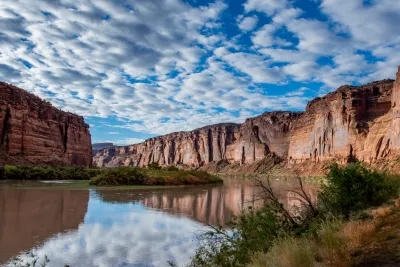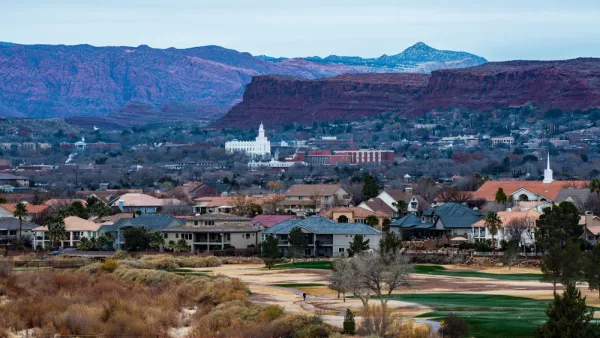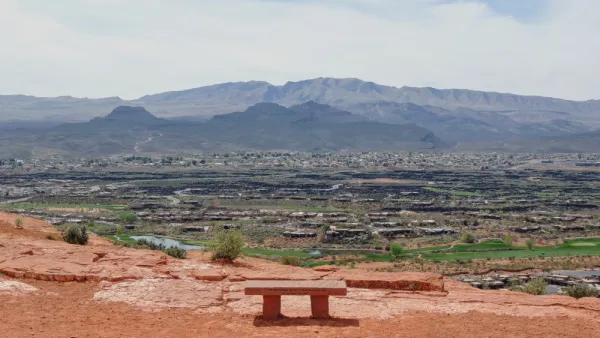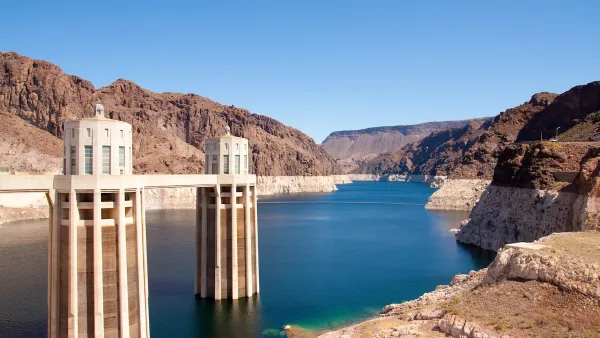After a year of contentious negotiations, Western states dependent on the river’s water supply are nearing a deal that would reduce water use significantly over the next three years.

California, Arizona, and Nevada are close to reaching a deal to protect the Colorado River’s threatened water supply. According to an article by Joshua Partlow in The Washington Post, the Lower Basin states have so far been reluctant to submit feedback on the federal government’s proposed alternatives, claiming they can come to an agreement of their own.
As Partlow explains, “The consensus emerging among these states and the Biden administration aims to conserve about 13 percent of their allocation of river water over the next three years and protect the nation’s largest reservoirs, which provide drinking water and hydropower for tens of millions of people.”
The proposed deal would cut back roughly 3 million acre-feet of water in the next three years in exchange for federal funding from the Inflation Reduction Act. Despite contentious negotiations between California and Arizona, the river’s top users, over the past year, “these states now appear more united than ever and are closing their differences with the federal government, even as significant issues remain unresolved.”
After a historically wet winter, the river’s reservoirs are in less dire condition than they were last year, but officials from Upper Basin states (Colorado, New Mexico, Utah and Wyoming) want to see more binding commitments to conservation from Lower Basin states. Becky Mitchell, Colorado’s representative in the negotiations, insists that the states need to reevaluate their relationship with the river, saying that “the enemy is not any organization, agency or part of the basin.” Rather, “The enemy is the old way.”
More background on the Colorado River crisis:
FULL STORY: States near historic deal to protect Colorado River

National Parks Layoffs Will Cause Communities to Lose Billions
Thousands of essential park workers were laid off this week, just before the busy spring break season.

Retro-silient?: America’s First “Eco-burb,” The Woodlands Turns 50
A master-planned community north of Houston offers lessons on green infrastructure and resilient design, but falls short of its founder’s lofty affordability and walkability goals.

Delivering for America Plan Will Downgrade Mail Service in at Least 49.5 Percent of Zip Codes
Republican and Democrat lawmakers criticize the plan for its disproportionate negative impact on rural communities.

Test News Post 1
This is a summary

Test News Headline 46
Test for the image on the front page.

Balancing Bombs and Butterflies: How the National Guard Protects a Rare Species
The National Guard at Fort Indiantown Gap uses GIS technology and land management strategies to balance military training with conservation efforts, ensuring the survival of the rare eastern regal fritillary butterfly.
Urban Design for Planners 1: Software Tools
This six-course series explores essential urban design concepts using open source software and equips planners with the tools they need to participate fully in the urban design process.
Planning for Universal Design
Learn the tools for implementing Universal Design in planning regulations.
EMC Planning Group, Inc.
Planetizen
Planetizen
Mpact (formerly Rail~Volution)
Great Falls Development Authority, Inc.
HUDs Office of Policy Development and Research
NYU Wagner Graduate School of Public Service





























